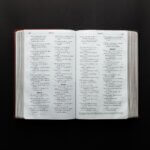Navigating through the Bible, be it your first venture or you’ve been at it for years, can seem challenging. Unsure about where to commence, or the sequence for reading? We hope that this article serves as a beacon of wisdom and clarity, addressing both these concerns for you.
Let’s dive in:
The Bible is a Really Big Book
There are over 700,000 words in the average English translation of the Bible. Tolstoy’s War and Peace comes close, at 561,304 words. At least with War and Peace the order of reading is self-explanatory. You start at the beginning, and read straight through until you come to the end. Unlike War and Peace, the Bible is composed of 66 different books by 40 human authors. It can take quite some time to read through the entire Bible.
It spans a broad range of literary genres, from poetry to history to proverbial wisdom. It was written in multiple languages, and was composed over the course of two millennia. And yet to the astonishment of scholars, literary critics, and everyday readers like you and me, the Bible possesses a profound coherence in what it teaches, and a profound unity in the story it unfolds.
So where to start reading the Bible?
Reading Straight Through the Bible
Should the Bible be read like War and Peace? As the Bible is one unified story that tells how God saves sinners, the short answer is yes! You can start at Genesis 1:1, and read straight through to Revelation 22:21. Even if you are a slow reader it would only take you 20 minutes a day for one year to complete it. If you happen to be a faster reader, it would only take you fifteen minutes each day. In that sense, it is very encouraging to consider that, by setting aside fifteen to 20 minutes each day, the entire Bible can be read through in a year. That is certainly one approach…
The Bible is Equally Inspired, but Not Equally Worthy of Attention
However, if you are new to the Bible, there are several things to consider. While every bit of the Bible is reliable, belongs, and is profitable for us (2 Tim 3:16), not every bit is equally profitable, nor is every bit meant to be given equal attention. “Genealogies” are long lists of names that tend to pop up in Old Testament books. Genealogies don’t possess the same depth as, say, Paul’s words of encouragement to us in Romans 8. That is not to say that genealogies are worthless. They remind us that we all—with our unique names and stories—are valued and remembered by God. But we don’t need to study them with the same level of attention as, say, Jesus’ “high priestly” prayer in John 14–17.
Where to Start Reading the Bible?
Although the Bible is one big unified story, you can jump in almost anywhere, and benefit. If you are relatively new to reading the Bible, Mark’s Gospel is a great place to start. Of the four historical accounts of Jesus’ life, death, and resurrection (Matthew, Mark, Luke, and John), Mark is the most concise and direct.
The whole Bible is ultimately about Jesus, so reading about his life is a great introduction to the rest of the Bible (Luke 24:27). All the other books and topics in the Bible are like planets orbiting around Jesus. He is the source of light, life, and beauty that stands at the center and holds everything else together (Col 1:17).
Read this post if you’re interested in learning how the Bible is organized.
After Reading Mark, Add a Psalm
The book of Psalms has been called the prayer book of the Church. For 2,000 years, it has given God’s people words for when they are stuck, sad, or seemingly without hope. Most people feel overwhelmed when they try and pray. Reading a Psalm aloud and then putting it in your own words is to attend a school of prayer. Selecting one book of the Bible to always be reading straight through, a chapter at a time, can serve as your main course.
You might begin with Mark, and then move to Genesis, and after that Colossians, and then perhaps Romans. Then, on the side, you can supplement by also choosing at least one Psalm and one chapter of Proverbs. First, the Psalms. There are 150 Psalms, so it’s hard to know where to start. Scholar and author Donald Whitney offers a simple and straightforward strategy:
One approach to choosing a Psalm to pray through is the “Psalms of the Day” approach. This divides the 150 Psalms into 5 Psalms for each of 30 days in a month. Take the day of month as your first Psalm. Then keep adding 30 to that number until you get 5 Psalms. So on the 15th of the month, your first Psalm is Psalm 15. To Psalm 15, add 30 to get the next one, Psalm 45. These would be followed by Psalm 75, then 105, and 135. (On the 31st, use Psalm 119.) Take 30 seconds to scan these five Psalms, then choose one to pray through…
Let the words of Scripture become the words of your prayers. For example, if you pray through Psalm 23, read “The Lord is my shepherd,” and thank Him for being your shepherd. Ask Him to shepherd your family that day, to guide, protect, and provide for them. Pray that He will make your family members His sheep; that they will look to Him as their shepherd. Ask Him to shepherd you through the decision you must make about your future… When nothing else comes to mind, go to the next line—“I shall not want”—and continue to pray. Simply go through the passage, line-by-line, praying what you find in the text or what it brings to mind. If nothing comes to mind, or if you don’t understand the verse, go to the next… Nothing says you have to pray over every verse. Continue in this way until (1) you run out of time, or (2) you run out of Psalm.
After a Psalm, Add Proverbs
The book of Proverbs invites us to grow in wisdom and discernment as we chew on its fatherly counsel for all of life. Wisdom has been defined as skill in godly living. Discernment is the art of approving what’s excellent (Phil 1:3–11)—choosing between bad and good, and even between good, better, and best (Heb 5:14).
As you read through Proverbs, it can feel as jumbled as a kitchen junk drawer, but there’s a method to the seeming tangle. Since each chapter covers a broad array of topics in quick succession, you’ll be armed for whatever your day might throw at you. One scholar suggests we think of Proverbs as a spiritual multivitamin. One particular chapter of Proverbs might alternate between offering counsel on: parenting, handling money, telling the truth, and working diligently. There are 31 chapters in the book of Proverbs, so you can select today’s chapter by consulting your calendar. It’s June 16th, so you read Proverbs 16. Simple!
When It’s Time to Tackle the Whole Bible in Order
At the end of his ministry, as he said goodbye to his friends, the Apostle Paul proudly declared “I did not shrink from declaring to you the whole counsel of God” (Acts 20:27). The whole Bible is like a spiritual food pyramid. Many meals are nourishing and healthy, but if you ate the same meal over and over, eventually you would develop a nutritional deficit.
After you follow the simple plan laid out above, and you feel ready for a challenge, you can choose a reading plan that will take you through the whole Bible. Comprehensiveness matters more than pace. You might select a plan that takes you through the whole Bible in two years instead of one. Finishing matters more than moving fast.
Don’t Be Overwhelmed
If you survey Bible reading plans, you might get overwhelmed. Suddenly you have to choose between:
- Reading from a different genre each day (poetry, history, epistles, etc.)
- Reading chronologically (since the books of the Bible are not organized in chronological order)
- Reading plans that provide one or two “skip days” each week to prevent falling behind and discouragement
- Reading plans that take you through the Old and New Testament in two years, and the book of Psalms four times in two years
- Reading thematically by matching Old Testament readings with New Testament readings that connect to and amplify those Old Testament themes
In one sense, any one of these plans could serve you well. But an argument could be made that certain plans are better than others for a first attempt at reading through the whole Bible.
Some Bible Reading Plans Are Better for Beginners
For example, the Discipleship Journal Bible Reading Plan provides one day each week to catch up on any missed days. It provides not only a set of longer Old Testament and New Testament readings, but also a briefer reading from the Psalms or Proverbs. This helps illustrate how not every passage needs to be read at the same speed, or with the same attention to detail. This helps you practice reading not only for study, but also for meditation—chewing thoughtfully on a brief passage and turning it into your prayer. For example, on the same day that you are scheduled to read Leviticus 26 and 27, you are also invited to slow down and make Psalm 47 your prayer, as well as attend to a concise portion of Jesus’ teaching in Matthew 21:12–22.
Ask for Help
Nobody opens the Bible without experiencing a measure of disorientation and confusion. Learning how to understand what you read and then apply it to your life in fruitful ways is a lifelong journey. It has been well said many times that the Bible is accessible enough for a toddler to splash in, and deep enough for an elephant to swim in. You will get more out of what you read than you might assume, but it’s not wrong to ask for help, and learn from wise and thoughtful people who have devoted their entire lives to studying the Bible.
- In his concise book Read This First: A Simple Guide to Getting the Most from the Bible, Gary Millar helps us realize that we already have the skills we will need to get something out of reading the Bible. Whether you are a new Christian, or a long-time Christian who has never settled into a habit of regular Bible reading, Millar will help you get started.
- Similarly, Donald Whitney, in his book Praying the Bible, offers a simple method for using Scripture to keep our prayers from becoming rote and boring (as referred to above).
- Finally, in his book One-to-One Bible Reading, David Helm offers a simple method as well as accompanying plans for reading the Bible together with someone else.
Grow in Your Biblical Understanding
Eventually you will grow comfortable enough with the Bible that you’ll know what books of the Bible—what chapters, even—speak best to particular topics. As you grow in your familiarity with the Bible, you will need to also grow in your ability to interpret the Bible. Few things will undermine our confidence in the Bible quicker than the experience of someone speaking where the Bible is silent, or remaining silent where the Bible speaks.
Do all the commands of the Bible apply today? Were the ancient manuscripts of the Bible transmitted accurately? Why can’t people agree on what the Bible means? Does the Bible teach that God wants Christians to be healthy and wealthy? Robert Plummer’s book 40 Questions About Interpreting the Bible offers concise answers to a myriad of questions about the Bible. As you educate yourself, you will gain increasing confidence to read, study, and seek to apply Scripture to the real stuff of your everyday life.





